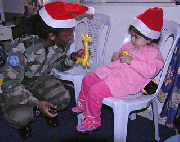AIN IBL, LEBANON – Ten toddlers at a nursery school in this southern Lebanon village had a surprise visit from an unlikely version of Santa Claus this week when French United Nations soldiers dressed up to hand out Christmas gifts.

|
|
A French UNIFIL soldier with a toddler at the Ain Ibl nursery school in South Lebanon, where the UN peacekeepers handed out Christmas gifts this week. PHOTO:Nicholas Blanford |
“We wanted to bring a happy Christmas to the children in our area of responsibility,” says Col. Nicolas Casanova, the commander of UNIFIL’s French contingent. “Each soldier donated money to buy a gift for a child.”
In the era of the war on terrorism and the campaigns in Iraq and Afghanistan, winning hearts and minds is considered as important as defeating combatants. UNIFIL, which arrived in Lebanon in 1978 after Israel’s first invasion here, learned that long ago.
UNIFIL was powerless to force Israel out of Lebanon, so it invested much of its effort in providing assistance to the poor local population. Although small in scale, those activities cemented a strong bond between the peacekeepers and residents.
“The medical services we offered broke the ice with the people,” says Timur Goksel, a university lecturer in Beirut who served with UNIFIL from 1979 to 2003. “We had no U.N. budget and we soon learned not to throw anything away but recycle it to the local people.”
Following the month-long war between Israel and Hizbullah in the summer of 2006, UNIFIL was given a new mandate and was heavily reinforced from 2,000 to 13,300 peacekeepers. The enlarged military mission also led to the establishment of a civilian affairs unit that liaises with local municipalities and nongovernmental organizations. That team is allocated $500,000 each year for “quick impact” projects, while the nearly 30 contingents donate between $5.5 million to $6.9 million annually for projects in their respective areas of operation, according to UNIFIL.
Municipalities also pitch projects to the civil affairs team – such as the construction of roads, playgrounds, and renovations to schools and cultural centers. The diversity of nationalities within the U.N. force creates an eclectic mix of services – pizza and bread making by the Italians, Taekwondo classes by the Koreans, and language classes by the Spanish and French.
While UNIFIL has broad support among locals, suspicions linger that it’s here to curb Hizbullah rather than halt Israeli territorial violations. UNIFIL’s critics note that it has been powerless to prevent Israeli jets from penetrating Lebanese airspace on a near daily basis.
Even as the various UNIFIL battalions carried out festive visits to villages this week, some peacekeepers worked to ease a recent flare-up of tensions along the Blue Line, the U.N.’s name for the boundary corresponding to the international border.
On Friday, Tarraf Tarraf and his brother Hassan Tarraf were captured by Israeli troops and held overnight in Israel.
Tarraf says he and his brother were pruning olive trees close to the border when they were grabbed by around 10 Israeli soldiers. A guard dog attacked Hassan. Tarraf says both of them were blindfolded, handcuffed, and led away. “They kept us outside for the night. It was very cold, and my brother was bleeding heavily from his wounds,” he says.
They were interrogated about Hizbullah and released to UNIFIL troops and returned to Lebanon the next day.
Amid accusations in Lebanon of a serious Israeli territorial violation, UNIFIL and Lebanese troops on Monday visited the scene of the incident to investigate. Along some sections of the frontier, the Israeli fence can dip some 200 yards inside Israel, but the Blue Line itself is left unmarked. This has led to numerous occasions when Lebanese farmers and shepherds have accidentally strayed into Israeli territory.
The Tarraf brothers insist they were inside Lebanon. UNIFIL says that when the investigation is complete, the findings will be handed to Lebanon and Israel.
UNIFIL’s studious impartiality does not impress Hassan Tarraf. “Why does UNIFIL keep its eye on the victims, not the aggressors – the Israelis with their tanks and weapons? They should be watching both sides of the border.”






Leave a Reply